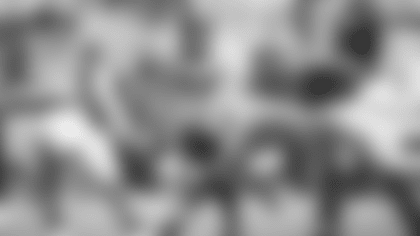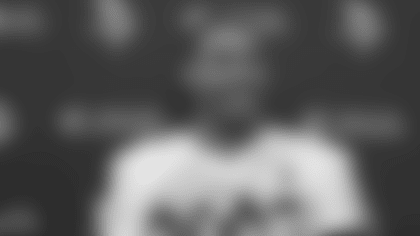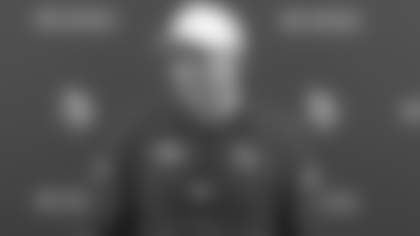Vikings Offensive Coordinator Pat Shurmur
Q: How did the interview process go for you?
A: That happened over the course of a couple of days at the end of last week. I enjoyed the conversations that I had, but I was able to quickly put that on the back burner as we got ready for this week's game.
Q: What is this time like as you wait to hear back from teams while also preparing for Sunday's game?
A: I think we as coaches our whole lives have learned how to stay in the moment. Again, you do one thing and then you move on to the next. I really enjoyed the time I spent with those teams, but you quickly get back to preparing for the Saints. Fortunately, this is a team that we've played before, so part of it feels kind of like a division game. We had a lot of the work done. We obviously spent a lot of work last week on the three teams that we might play, and then once we found out Sunday night who we were going to play we quickly got to the task of getting ready to play the Saints.
Q: Do you lean on people like Coach Zimmer for advice when going through the interview process?
A: When you go talk to people you obviously prepare, as each situation is different. Every team right now that's not playing in the playoffs has quickly turned their focus to "how am I going to improve my team." These are teams that are looking for a head coach, so they've got that as part of their process. They were very easy conversations in terms of what your philosophy might be, but as I mentioned, I approached all of them with the same mindset, and then quickly put it on the back burner.
Q: Now that the interviews have concluded, have negotiations started with any of those teams?
A: There is another time to talk about all that stuff. As I mentioned, our whole focus right now is playing the Saints.
Q: Drew Brees and Case Keenum finished number one and two in completion percentage this season. What do you see in their different quarterbacking styles that ultimately results in similar levels of accuracy?
A: I think they're very similar in terms of their approach to the game. They know how important a completion is. It's important for your offense, a short completion sometimes can turn into a long gain. Their appreciation for that shows up, and it's similar. They also know how to drive the ball down the field. We're two of the top teams in terms of getting the ball down the field, so they understand that as well. They understand that they need to play a good consistent game and take care of the football to help their teams win.
Q: When you're a shorter quarterback like both of those guys are, how does that alter your approach to finding throwing lanes and making sure balls aren't batted down?
A: Typically shorter quarterbacks, just by the nature of being behind very tall blockers and rushers, get balls batted down. But I think Case and Drew do a very good job of finding a lane to throw the ball in, and if they can't, they'll clear their vision by moving around in the pocket or escaping the pocket. I think all quarterbacks have a skill set that they play to, and both Case and Drew do that.
Q: When you've been short your whole career, do you have to learn how to manage that?
A: I'm assuming they've both been shorter their whole life, so they get used to their style of play.
Q: Do you become a more resourceful quarterback dealing with a height disadvantage?
A: I don't know. I think we just addressed it, that you play to your style and you play to your skill set. It's important for us as coaches to know that and be able to do the things that can help them.
Q: You've had success over two seasons with both Sam Bradford and Case Keenum. What has been the key to incorporating different styles at quarterback and still having success?
A: Well they're both very good football players, so that's where it starts. Offensive systems are broad, and we have a lot of plays. We all like plays that work, and so what we try to do is just focus on the plays that fit the skill set of the quarterback that's playing. This game is about matchups, what we think to be our three best receivers have been targeted the three most times. We just try to do what we can to get the ball in the hands of the good players, and have the quarterback be able to do it in a way that fits his skill set.
Q: How have you adapted to Case Keenum's strengths?
A: I think what we've done is we've moved the pocket a little bit, we get the ball out quickly. Basically the way that we try to play offense can fit a guy that might be a little shorter in stature.
Q: Moving from 28th in the red zone last season to 9th this season, what do you think has enabled that jump?
A: I think first, we've done a really good job of making sure when we get down there to not back ourselves up. We've really limited the turnovers, number one, we had a couple last year, but also the penalties that will move you back. If we can stay ahead of the chains, then some of the things that you want to do as you approach the goal line you're able to do. You get those long third down situations in the red zone, the script quickly flips towards the defense. They'll let you get a completion, but it's hard to get it in. It's important that we're efficient down there, and when we take our shots at it, we hit on them. I think Case has done a good job of doing that.
Q: If after Sunday's game you are able to look back and say, "Case played well today," what will he have done?
A: In my mind initially, he's helped us win the football game. That's first and foremost. There are always things when we say he's played well that he would want to do better, but I would say if he plays a good efficient game and we don't turn the ball over, we have a chance to score touchdowns, and he helps us do that. Generally, in a game like this, just helps us win the game.
Q: What does that mean though?
A: Play quarterback well, and I think we all know what that means. I'm not trying to avoid the question. Complete a lot of balls. There are certain things we ask him to do at the line of scrimmage to get us in the right play; do those things. If we take our shots, hit on them. Just all the things that you would look for a quarterback to do in any game.
Q: What is it about Mike Remmers' skill set that allows him to slide inside and play guard?
A: Well he's a good player. He's got enough size where he can anchor down, but he's also a guy that can move around. He uses his hands well, he works well together with the guard if he's playing tackle, and certainly the tackle if he's playing guard. He's very smart, I consider him a fast blinker, so when things move around in there he's able to sort through it. We knew he had played other positions, but he's proven to us that he's a pretty multiple guy.
Q: As both a coach and someone who played center yourself, what have you seen from Joe Berger and the versatility he brings to the team?
A: Yes, it's important. First, to be a center you've got to be a good decision maker, and you can't be a slow blinker. You're up there directing, and you've got to know what you're looking at, know when you see it, and pull the trigger. I think Joe does that extremely well, certainly Pat [Elflein] has done it well throughout the year. It comes down to being really good at what you do. Some guys can't pull the trigger, and some guys are delayed in their communication, and Joe is not that way. Beyond that, he can block his guy and he works well in tandem with the guards, so he's just a really good football player and he's had a great year for us.
Q: Both from a coach's perspective and as someone who has played center as well, what have you seen from Joe Berger and just what he's been able to bring to team as far as versatility and his skill set?
A: Yes, it's important. First to be a center, you have to be a good decision-maker and you can't be a slow blinker. You're up there directing and you have to know what you're looking at, know when you see it, and pull the trigger, and I think Joe does that extremely well. Certainly Pat [Elflein] has done it well throughout the year, and so it comes down to being really good at what you do, and some guys can't pull the trigger or some guys are delayed in their communication, and Joe's not that way. Beyond that, he can block his guy and he works well in tandem with the guards and so he's just a really good football player. He's had a great year for us.
Vikings Defensive Coordinator George Edwards
It's good to have a home game this weekend and we're excited about getting the opportunity to play in the playoffs at home, and hopefully our home crowd will be a big advantage for us here defensively. We are excited about the opportunity.
Q: What's key to combating Alvin Kamara and everything he can do?
A: He's excellent at running the ball out of the backfield. He's excellent. You see him in the passing game quite a bit, the screen game, so we will have our challenges making sure we keep him contained during the course of the day. They've found a lot of different roles for him, he plays a lot of different positions for them, so he's somebody we'll definitely have to make sure we're on top of and what they're doing with him.
Q: What do you attribute the third down success that you guys have had to?
A: I think it's a concentration on the detail of our guys. Our pass rush and our pass coverage, they go together, and guys understanding what we need to take away from week-to-week. Going out and executing the plan that we have in, so their attention to detail with that has been the biggest bonus for us.
Q: How similar are the Saints offensively, to Week One?
A: There are some similarities, but they've grown as an offense. They've had some different parts, moved some parts around, so like anybody else, you kind of grow as the season goes and find roles for different guys, and they've done a good job of that. Plus, their quarterback is excellent at seeing what you're doing coverage-wise and being able to deliver a ball to an open guy.
Q: Are they more likely to take shots on say, third and short?
A: Yes, down and distance sometimes doesn't matter. They're going to execute their play and whatever you're giving them coverage-wise, they're going to try to get the ball to who they feel like they need to get the ball to, so that's one of the things, and they have certain areas on the field they like to take shots, so we have to be alert and be aware of when those situations are.
Q: Does that fit Sean Payton's personality, being more of an aggressive guy?
A: There's no doubt about it, especially like I said, you have a first ballot Hall of Fame quarterback that does an excellent job of going out and executing their game from week-to-week. Our work will be cut out for us keeping them contained and hopefully giving them some things that can cause them some problems.
*Vikings Special Teams Coordinator Mike Priefer *
Good afternoon everybody, hope you're doing well. Obviously an exciting time for our franchise. First playoff game in our beautiful new stadium, in front of our great fans. It's going to be an awesome atmosphere, great experience and we're getting ready to roll.
Q: What's the difference in pressure a kicker might feel in the playoffs? Is there something pretty tangible there?
A: I think it depends on the kicker. Talking with Kai [Forbath] to him it's going to be business as usual. He's got to go out there. Once he goes out on the field and gives the head nod to the holder, to him its business as usual. "I just got to go do my job and make my kick." I think pressure it's probably beforehand, but once you get out there it should be like he's been practicing forever.
Q: With the narrative of playoff experience, and he obviously had that in Washington, how much does that play into it with kickers? Is that an important thing that they need?
A: I think the more pressure kicks they kick during the year or in their career, and Kai's not a young guy. I think he's maybe 30 years old and he's been in some pressure situations, even this year and he's come through for us. And the pressure situations at Washington, made that big kick that 50-some-yarder, made the game winner at Chicago, made a big kick at Green Bay just to open up the game in those difficult conditions. He's been there before in terms of the pressure situations, so hopefully that will carry over into the playoffs.
Q: What do you see in the Saints returners?
A: Alvin Kamara is outstanding and we knew studying him as a returner he didn't have a ton of experience at Tennessee, but enough to say this guy is going to be really good someday. I think the more he does it, the more confident he gets and that's what makes him very dangerous. And Tommylee Lewis I thought he was a great punt returner last year and then this year he's gotten his opportunities and he's done a good job on kickoff returns as well. He just doesn't have the score like Kamara. But they're both very, very big threats for us and obviously something we've focused on all week and we've got to go out and do our job. We got to punt the ball well, we've got to kick the ball well, and then we've got to cover.
Q: How much time did you spend on Kamara before the draft?
A: I think he was here on the Top 30 visit, so just a little bit – interviewed him and got to know him a little bit, like we typically do on those Top 30 deals. He seemed like a great kid. I know he had a great career. He's hard working. I think the more he becomes involved with their offense he becomes a better football player and that's what makes him such a big threat.
Q: Can you talk about punting and field position and the difference that can make on the defense?
A: I think for the most part we've done a really nice job with the punts, downing people inside the 20 and not getting touchback. And kickoffs, again for the most part we've had our glitches like most teams, but we've covered pretty well. But playoffs could be a different thing. I think the whole speed of the game increases because everybody knows there is no tomorrow unless you win. Whereas in the regular season, I don't think guys take plays off, I think the intensity is always there – like it should be, but it will be on Sunday and that's what will be the challenge for both teams getting ready for each other.
Q: How do you describe Kai Forbath's composure when things don't go so well?
A: He actually does a pretty good job. He does a better a job than I do. I'm a little bit more emotional than Kai, so typically if does miss a kick or doesn't hit a kickoff how we want it, I kind of give him two or three plays. I do that for myself, two or three plays – "Okay, I got to get my composure back". Then I'll go talk to him and it's usually it went off my toe or I didn't follow through right or whatever the case might be and we've just got to get him refocused and he'll go out and do his job. But he does a really good job of forgetting about the last one and going on to the next one.














